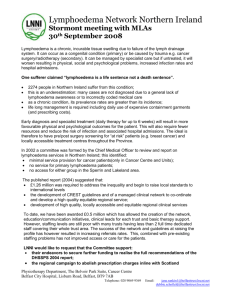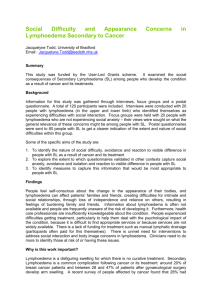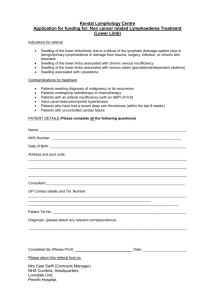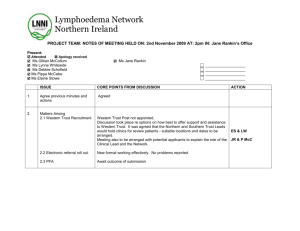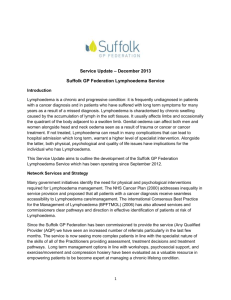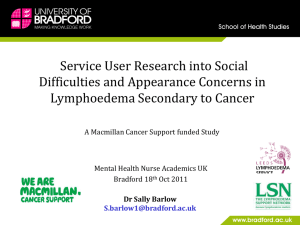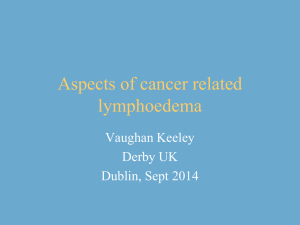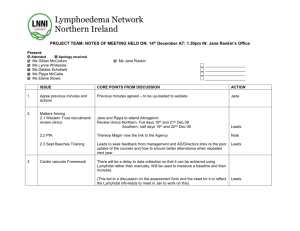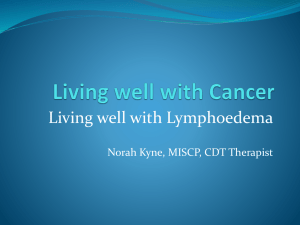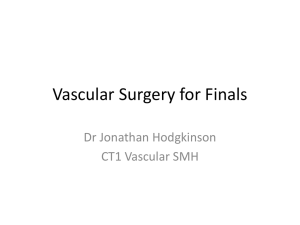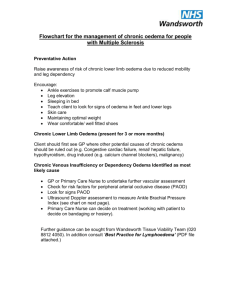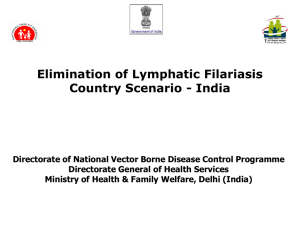PROGRAMME
advertisement
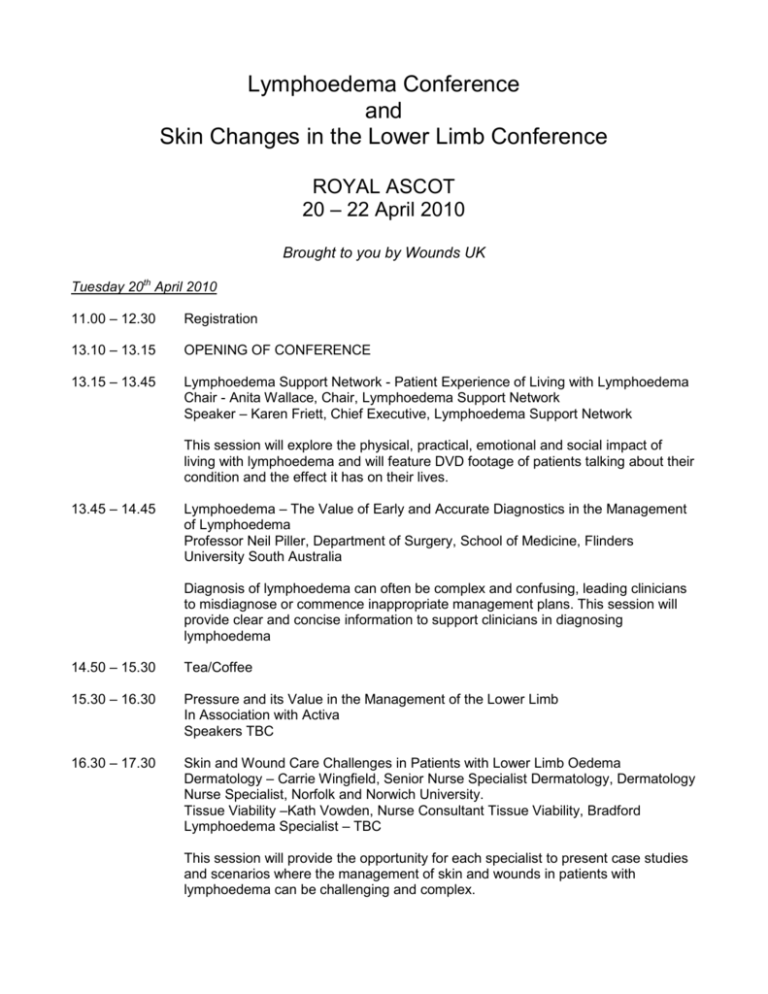
Lymphoedema Conference and Skin Changes in the Lower Limb Conference ROYAL ASCOT 20 – 22 April 2010 Brought to you by Wounds UK Tuesday 20th April 2010 11.00 – 12.30 Registration 13.10 – 13.15 OPENING OF CONFERENCE 13.15 – 13.45 Lymphoedema Support Network - Patient Experience of Living with Lymphoedema Chair - Anita Wallace, Chair, Lymphoedema Support Network Speaker – Karen Friett, Chief Executive, Lymphoedema Support Network This session will explore the physical, practical, emotional and social impact of living with lymphoedema and will feature DVD footage of patients talking about their condition and the effect it has on their lives. 13.45 – 14.45 Lymphoedema – The Value of Early and Accurate Diagnostics in the Management of Lymphoedema Professor Neil Piller, Department of Surgery, School of Medicine, Flinders University South Australia Diagnosis of lymphoedema can often be complex and confusing, leading clinicians to misdiagnose or commence inappropriate management plans. This session will provide clear and concise information to support clinicians in diagnosing lymphoedema 14.50 – 15.30 Tea/Coffee 15.30 – 16.30 Pressure and its Value in the Management of the Lower Limb In Association with Activa Speakers TBC 16.30 – 17.30 Skin and Wound Care Challenges in Patients with Lower Limb Oedema Dermatology – Carrie Wingfield, Senior Nurse Specialist Dermatology, Dermatology Nurse Specialist, Norfolk and Norwich University. Tissue Viability –Kath Vowden, Nurse Consultant Tissue Viability, Bradford Lymphoedema Specialist – TBC This session will provide the opportunity for each specialist to present case studies and scenarios where the management of skin and wounds in patients with lymphoedema can be challenging and complex. 17.30– 19.30 Conference Exhibition Opens – Champagne Reception Wednesday 21st April 2010 08.00 Registration Exhibition Viewing – Exhibition Hall 09.00 – 09.45 Parallel Sessions Lymphoedema Conference Lymphoedema in Palliative Care Dr Vaughan Keeley, Consultant in Palliative Medicine, Derby This session will discuss the palliative management of lymphoedema, where the intention is to relieve symptoms, when treatment aimed at curing the underlying condition is not possible. Skin Changes in the Lower Limb Conference Making Sense of Lower Limb Diagnostics – When and where should Doppler, Duplex scanning, pulse oximetry, X-ray, ultrasound scan be used Speaker TBC 09.50 – 10.35 Lymphoedema Conference Lymphoedema and Obesity – challenging the link Justine Whitaker, Senior Lecturer, University of Central Lancashire Skin changes in the Lower Limb Conference When is a wound not a wound – malignancy identified? Dr Stuart Enoch, Specialty Registrar in Plastic Surgery, University Hospitals of South and Central Manchester 10.35 – 11.05 Tea/Coffee and Exhibition Viewing 11.05 – 11.50 Lymphoedema Conference A strategy for Lymphoedema in Wales – aims to help address the current wide variation in the organisation and delivery of lymphoedema services in Wales. Melanie Lewis, Lead Clinical Lymphoedema Specialist Physiotherapist, South West Wales Skin Changes in the Lower Limb Conference Best Practice in the management of the diabetic foot has been identified – how can this be achieved in areas with limited services – what should our patients expect/resource implications? William Jeffcoate, Consultant Endocrinologist, Nottingham University, Nottingham 11.50-12.35 Lymphoedema Conference Surgical Intervention in the Management of Primary Lymphoedema Speaker TBC Skin Changes in the Lower Limb Conference Complex Wounds of the Lower Limb and Foot – supported by case studies Speaker TBC 12.35 – 14.00 Lunch and Exhibition Viewing 14.00 – 14.45 Lymphoedema Conference New Directions/Strategies for the Treatment of Lymphoedema: What the future holds for practitioners and patients Professor Neil Piller, Department of Surgery, School of Medicine Flinders University South Australia Skin Changes in the Lower Limb Conference The Use of New Approaches in the Management of Lower Limb Wounds – leg ulcers, diabetic foot – TNP, Versajet, Skin substitutes, Anti-microbials. Paul Chadwick, Principle Podiatrist, Salford Duncan Stang, National Diabetes Foot Co-ordinator, Scotland 14.50 – 15.30 Lymphoedema Conference Psychosocial aspects of living with lymphoedema Professor Dominic Upton, PhD, FBPsS, Institute of Health and Society, University of Worcester Skin Changes in the Lower Limb Conference Heel Ulcers – when are they a pressure ulcer and when are they an indication of poor vascular perfusion – how should they be managed? Louise Stuart, Senior Lecturer, School of Podiatry, Salford 15.30 – 16.00 Tea/Coffee and Exhibition Viewing 16.00 – 17.00 Lymphoedema Conference/Skin Changes in the Lower Limb conference MLD– is it Friend or Foe – Debate This debate will centre on a panel of experts who will discuss the use of MLD in those with uncontrolled or unknown cancers. They will start by discussing evidence that MLD does increase lymph flow directly and indirectly. Then discuss impact this may or may not have in facilitating the spread of cancer. 19.00 PRE-DINNER CHAMPAGNE RECEPTION 20.00 GALA DINNER Thursday 22nd April 2010 09.30 – 10.15 Benefits of Physical Activity in Lymphoedema Management Anita Hopkins, Macmillan Lead Lymphoedema Specialist, Gloucestershire Macmillan Lymphoedema Service Sue Desborough Lymphoedema Therapist, St Giles Hospice 10.20 – 11.20 World Alliance for Wound & Lymphoedema Care - A Global Imperative John McDonald Secretariat, World Alliance for Wound and Lymphoedema Care (WAWLC), Department of Dermatology and Cutaneous Surgery, Miller School of Medicine, University of Miami, USA 11.20 – 11.45 Tea/Coffee and Exhibition Viewing 11.45 – 12.20 Preventing Leg Ulceration Recurrence – RAL Compression Therapy In Association with Medi UK Ltd 12.25 – 13.10 Genetics and Primary Lymphoedema: an update Primary lymphoedema a cause of considerable morbidity in the general population, but the identification of genes underlying the condition has been a relatively slow process. A summary of the known genetic factors involved in the development of primary lymphoedema will be presented, including CCBE1. This gene was recently discovered, by our research group at St George’s, to be mutated in generalised lymphatic dysplasia. It is hoped that the delineation of specific primary Lymphoedema phenotypes and the advent of new technologies will further help in the search for more new genes. Dr Fiona Connell, St Georges Hospital, London 13.10 – 13.15 Conference Close – closing remarks
